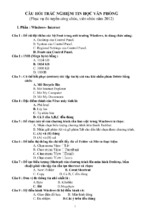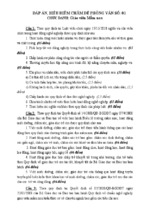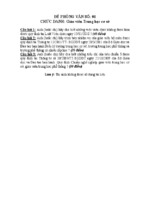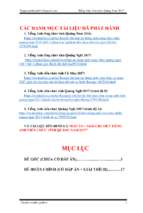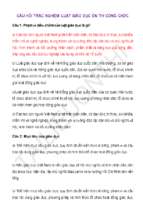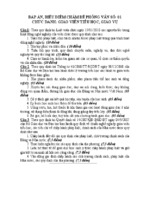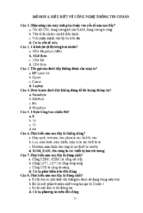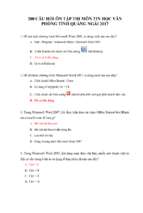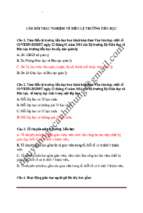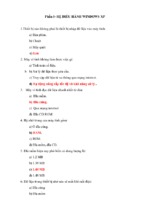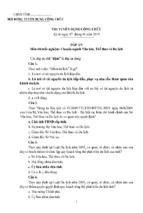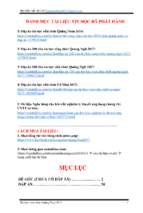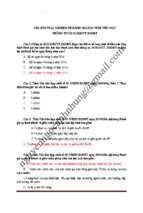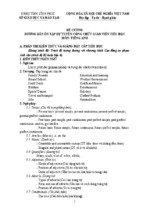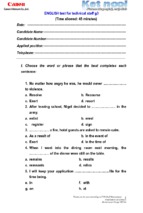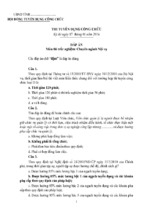HỘI ĐỒNG THI CÔNG CHỨC NĂM 2015
NỘI DUNG ÔN TẬP THI CÔNG CHỨC NĂM 2015
MÔN: NGOẠI NGỮ (TIẾNG ANH)
(Thí sinh dự tuyển các ngạch: Chuyên viên, Kế toán viên,
Kiểm soát viên thị trường)
THEMES 1: PRONOUNS (đại từ)
A. THEORY
PERSONAL
POSSESSIVE
PRONOUNS
ADJECTIVES
(đại từ nhân xưng- (tính từ sở hữu
giữ chức năng chủ (của ai), luôn đứng
ngữ)
trước danh từ)
I
MY
YOU
YOUR
YOURS
HE
HIS
SHE
HER
IT
ITS
WE
OUR
YOU
YOUR
THEY
THEIR
POSSESSIVE
PRONOUNS
(đại từ sở hữu)
OBJECTS
(tân ngữ)
MINE
YOU
ME
YOURSEF
HIS
HERS
--OURS
YOURS
THEIRS
HIM
HER
IT
US
YOU
THEM
REFLEXIVE
PRONOUNS
(đại từ phản thân)
(chính tôi/chính cô
ấy...)
MYSELF
HIMSELF
HERSELF
ITSELF
OURSELVES
YOURSELVES
THEMSELVES
B. EXERCISES
I. Choose the correct pronoun to complete the follow ing sentences
1. Canoeing is a fun sport. Why don't you give ______ a try ?
A.me
B.yourself
C.you
D.it
2. Greg is reading an adventure book but it's not ______.
A.him
B.he
C.his
D.himself
3. The woman gave her son a big hug before leaving ______.
A.herself
B.him
C.he
D.himself
4. You do your work and I'll do ______.
A.mine
B.my
C.me
D.myself
Câu này nhé, ở vế trước, your work thì your là tính từ sở hữu, thì vế sau nếu đủ ra là my work, và rút
gọn ra thì mine (=my work)
5. Fred's car has broken down. ______ has to be taken to the mechanic.
A. He
B.Him
C.Its
D.It
6. Look at that poor dog. it is limping because ______ foreleg is injured.
A.his
B. it
C.it's
D.its
Câu này là cái chân của con chó, con chó trong trường hợp này đc tính là giống đực, dùng his, ko phải
là its, it dùng cho sự vật, đồ vật vô tri vô giác, sự việc
7. Why doesn't she use that pen ? It is ______ isn't it ?
A.herself
B.hers
C.she
D.her
8. Harriet tried ______ best to solve the problem but she could not do it.
A.herself
B.hers
C.she
D.her
9. This file is ______, isn't it ?" Annie asked Angie.
A.you
B.yourself
C.your
D.yours
10. The twins played by ______ while ______ mother did the laundry.
A. himself ... his
B. themselves ... her C. himself ... they
D. themselves ... their
11. He blamed ______ for causing the accident.
A. He
B.Him
C.himself
D.It
12. Let's make ______ some fish and chips for lunch.
A. we
B.us
C.ours
D.ourselves
13. She told ______ never to lie to his mother again.
A.himself
B.hers
C.she
D.him
14. You must give ______ back her money or she will complain to the teacher.
A.herself
B.me
C. him
D.her
II. Fill in the blanks with possessive pronouns or adjectives.
1. That policeman is a friend of …………….. (mine / my) (a friend of mine=my friend)
2. Honey, I have lost ………………. keys. (my / mine)
3. It is easy to lose ……………… temper when one is criticized. (ones / one’s)
One: ai đó, 1 đối tượng nois chung chung
4. The cat is in a good mood. It’s just had ……………… breakfast. (it’s / its)
It’s = it is
5. He watched each gesture of ……………. as if she was a stranger. (her / hers)
6. My work is no business of ………………. (your / yours)
7. The teacher told the children to open ……………….. books. (their / there)
8. How is that cousin of ………………? (your/ yours)
9. A friend of …………… has invited me to France. (my / mine)
10. Jane broke ……………. leg mountain climbing. (her / hers)
III. Fill in the gaps with the right answer (possessive adjective or possessive pronoun)
1. Mr. Brown has got a new car. __its__colour is red.
2. 'Where is Sue?' 'She's washing ___her_hands.'
3. Peter is doing _his____homework.
4. My brother and I are tidying __our___things.
5. They are going to the cinema tonight. They have already got ___their__tickets.
6. 'What are you doing?' 'I'm helping ___my___friends.´
7. Don't forget to take __your___raincoat. It's raining cats and dogs.
8. Mary is doing _her__homework.
9. Do you live with _your___parents?
10. We love _our___new car.
11. He's in _his___bedroom.
12. The children are with _their___father.
13. I like __my__job.
14. Are you and your friend enjoying __your__English classes?
15. Venice is famous for _its___canals.
16. She's with __her__ best friend.
17. They haven't got __their__ books.
18. She's in __her__office.
19. He's looking for _his___trousers.
20. I like visiting __my__friends.
21. Are the teachers having _their___meeting now?
22. Have you got __your__umbrella?
23. Jane has already eaten her lunch , but I'm saving __its___ until later
24. She has broken __her___ leg.
25. __my___ computer is a Mac, but __yours___ is a PC.
26. We gave them _our____ telephone number, and they gave us _theirs____ .
27. __my___ pencil is broken. Can I borrow _yours____ ?
28. __my___ car is cheap, but __yours___ is expensive .
29. You can't have any chocolate! It's all __mine___
30. My mobile needs to be fixed, but _yours____ is working.
IV. Put SOMEONE / ANYONE / NO ONE / EVERYONE in each gap
Cả 4 đều là đại từ bất định chỉ người (ko xác định rõ là ai)
Some one: ai đó, dùng trong câu khẳng định
Everyone: tất cả mọi người, dùng trong câu khẳng định
Any one: ai, bất kỳ ai, có ai (hay dùng trong câu phủ định và nghi vấn
No one: ko ai cả
Cả 4 từ này khi giữ chức năng chủ ngữ, chia động từ đều phải chia ở số ít (nghĩa là ví dụ nếu ở
thời hiện tại thì thêm s, es)
1. I needs __someone__________ to talk. I am so lonely.
2. I didn’t kill __anyone______ . Why did you put me in prison?
3. The bus was empty. There was ___no one______ on the bus.
4. There is ______someone______ at the door. Go and open it.
5. I didn’t meet ___anyone_________ this morning.
6. There was nobody at home. ___everyone_________ was away.
7. I’m looking for my keys. Has ___anyone_______ seen them?
8. _someone____ has broken my window. I don’t know who it is.
9. Has _____anyone_____ found my blue pencil? No. I’m sorry.
10. This question is easy because __everyone_____ can answer it.
11. Be careful! ___someone_________ is following you.
12. I rang the doorbell, but __no one________ opened the door.
13. She didn’t tell ___anyone_________ about her plans.
14. Oh, no! ___some one_________ has eaten my chocolate cake.
15. I can hear _____some one_______ at the door. Maybe they come to visit me.
16. I am sad because ___everyone_________ remembered my birthday.
17. Can______any one______ tell me the capital of Thailand? – Me.
THEMES 2: QUANTITATIVE ADJECTIVES
A. THEORY
1. much, many, a lot of ( lots of) : Nhiều
+ A lot of ( lots of): - Dùng trong câu khẳng định
- Dùng với danh từ đếm đựơc và danh từ không đếm được
+ Many - Dùng trong câu phủ định
- Đi với danh từ đếm đựơc
+ Much - Dùng trong câu phủ định
- Đi với danh từ không đếm được
Note: Too/ so/ as + many/ much : dùng trong câu khẳng định
2. Few and a few – Little and a little
a. Few and a few : - Một chút, một ít , một vài
- Đi với danh từ đếm đựơc
Eg:
The postman doesn’t often come here. We receive _______few_______ letters.
I can speak ______a few________ words of Swedish, but I’m not very fluent.
b. Little and a little: - Một chút, một ít
- Đi với danh từ đếm đựơc
Eg:
Vicky has made _______a little_______ progress and so is feeling quite pleased.
David quite likes golf, but he has ______little________ ability.
Lưu ý: a little, a few: mang nghĩa khẳng định (1 ít, 1 chút)
Little, few: mang nghĩa phủ định (quá ít, hầu như là ko có)
3. Some and Any
a. Some: Một chút, một ít , một vài
- Dùng trong câu khẳng định + lời mời
- Dùng với danh từ đếm đựơc và danh từ không đếm được
b. Any: Một chút, một ít , một vài
- Dùng trong câu phủ định và câu nghi vấn
- Dùng với danh từ đếm đựơc và danh từ không đếm được
B. EXERCISES
Ex 1. Put in a lot of, much or many.
1. We didn’t spend much money on holiday.
2. Ron Mason owns a chain of supermarkets. He’s made _____a lot of_________ money
3. I don’t know __many____________ people in this town
4. We are having a big party. We’ve invited ____a lot of__________ friends.
5. I feel really tired. I haven’t got _____much_________ energy.
6. There are no need to hurry. We’ve got ____a lot of__________ time.
7. She’s got too _______many_______ relatives!
8. They’ve got so _____much_________ money that they don’t know what to do with it.
9. Are there ____many__________ opera houses in London? ~ Not ____many__________ _, but there are ..a lot
of.. theatres and cinemas.
10. Do you have ______much________ trouble with English? ~ I don’t have _______much_______ trouble
speaking, but I have ____a lot of/much__________ difficulty writing.
Ex 2. Little or a little? Few or a few?
1. I can’t lift this box on own. I need a little help.
2. Anne is very busy these days. She has ____little__________ free time.
3. The postman doesn’t often come here. We receive ______a few________ letters.
4. Sandra is exhausted. She’s having ______few________ days' holiday next week.
5. Trevor isn’t finding it easy to fix the shelves. He’s having _______a little_______ trouble.
6. I can speak _____a few_________ words of Swedish, but I’m not very fluent.
7. David quite likes golf, but he has ____little__________ ability.
8. ____few__________ tourists visited Northern Ireland in the 1980 because of the terrorism there.
9. Vicky has made _______a little_______ progress and so is feeling quite pleased.
10. We’d better hurry. Our bus goes in _______a few________ minutes.
Ex 3. Put in much, many, a few, few, little, a little.
1. Did you take _____many_________ photographs when you were on holiday?
2. I’m not very busy today. I haven’t got ______much________ to do.
3. The museum was very crowded. There were too _______many_______ people.
4. The weather has been very dry recently. We’ve had _____little_________ rain.
5. Listen carefully. I’m going to give you _______a little_______ advice.
6. Do you mind if I ask you ______a few________ questions?
7. I need some money. Have you got any? – Yes, but not ____much__________ .
8. Would you like milk in your coffee? ~ Yes, please. ___a little___________ .
9. Have you ever been to Paris ? ~ Yes, I’ve been there _______a few_______ times.
10. Most of the town is modern. There are ____a few__________ old buildings.
11. The boys are making too _____much_________ noise.
12. How _____many_________ languages can you speak? Anh how ____much__________ time do you
spend on learning English?
13. There was _____a little_________ traffic, so the journey didn’t take very long.
14. The island is very small and does not have _____many__________ residents. The islanders do not have
________much______ money, and they have ______little________ contact with the outside world.
15. My home town is not a place attracting tourists. There are _____few_________ shops, and there is
16. ___little___________ entertainment.
THEMES 3: TENSES
A. THEORY
1. THÌ HIỆN TẠI ĐƠN. (Simple Present):
S + V (s, es)
a. Diễn tả hành động thường xẩy ra hay thói quen ở hiện tại.
Always, Often , Usually = generally, Sometimes, Rarely = Seldom ,Every /Week
/Sunday /Month…
b. Diễn tả chân lý, một sự thật hiển nhiên.
c. Diễn tả hành động xảy ra ngay lúc nói với các động từ tri giác, trạng thái.
See, need, Hear, hate, Smell, remember, Recognize, forget, Want, know, Understand, Have
2. THÌ HIỆN TẠI TIẾP DIỄN(prensent progressive)
S + be (is, am, are) +
a. Diễn tả hành động đang xảy ra ở hiện tại (lúc nói)
V.ing
Now, Right now, At the moment = now, Right at the moment = right now
b. Diễn tả hành động xảy ra trong tương lai có dự tính trước:Tomorrow, This morning /
afternoon, Next Sunday/ week / month
c. Diễn tả hành động không nhất thiết xảy ra lúc nói.(ex: He is teaching English and learning
French)
3. QUÁ KHỨ ĐƠN (simple past )
S + Ved
a. Diễn tả hành động xảy ra và hoàn tất trong quá khứ, đã xác định rõ thời gian: Yesterday, The
day before yesterday, Last week /Sunday /year
b. Diễn tả hành động hoàn tất trong quá khứ không biết mốc thời gian chỉ biết khoảng thời gian
hoàn tất công việc.
4. HIỆN TẠI KÉP (PRESENT PERFECT)
S + have/has + p.p
a. Diễn tả hành động vừa mới xảy ra. Thường có từ "Just" đi kèm.
b. Diễn tả hành động xảy ra trong quá khứ mà còn tiếp tục đến hiện tại hoặc tương lai : for, since,
Up to now
c. Diễn tả hành động xảy ra trong quá khứ mà không rõ thời gian: Before, Already, For years ,
For a long time, Many times
5. THÌ TƯƠNG LAI ĐƠN (simple future)
Diễn tả hành động xảy ra trong tương lai: Tomorrow, Net Sunday / week, In the future
B. EXERCISES
Ex 1: Choose the best answer A, B, C or D to complete the following sentences
1. When I last saw him, he _____ in London.
A. has lived
B. is living
C. was living
D. has been living
2. We _______ Dorothy since last Saturday.
A. don’t see
B. haven’t seen
C. didn’t see
D. hadn’t seen
3. The train ______ half an hour ago.
A. has been leaving
B. left
C. has left
D. had left
4. Jack ______ the door.
A. has just painted
B. paint
C. will have painted D. painting
5. My sister ________ for you since yesterday.
A. is looking
B. was looking
C. has been looking D. looked
6. I ______ Texas State University now.
A. am attending
B. attend
C. was attending
D. attended
7. He has been selling motorbikes ________.
A. ten years ago
B. since ten years
C. for ten years ago D. for ten years
8. Christopher Columbus _______ American more than 500 years ago.
A. discovered
B. has discovered
C. had discovered
D. had been discovering
9. I _______ in the room right now.
A. am being
B. was being
C. have been being D. am
10. I ______ to New York three times this year.
A. have been
B. was
C. were
D. had been
11. Doctors______an answer to AIDS yet.
A. have found
B. found
C. haven/t found
D.hasn/t found
12. He______to give up smoking since last week.
A. was trying
B.have tried
C. has tried
D. tried
13.He enjoys______in the rain.
A. walk
B. walks
C. to walk
D.walking
14.This school______ten years ago .
A. be built
B. is built
C. was built
D. built
15. Are you looking for my sister? – She isn't at home now. She______to the library.
A. went
B.goes
C. has gone
D. is going
Exercise 2: For each sentence, choose the best word or phrase to complete the gap from the choices
below.
1.The school usually ________ at six o'clock each day, but on Monday, it stayed open later.
A. stay
B. stays
C. is staying
D. has stayed
2.Last week we ________ some snow in our city but it didn't stay on the ground for a long time.
A. have
B. are having
C. have had
D. had
3.There ________ two accidents on this road so far this year and the one last night was quite serious.
A. are
B. were
C. have been
D. are going to be
4.He is a very active child. Probably, when he grows up he ________ very good at sports.
A. is
B. was
C. has been
D. is going to be
5.Please call me back later. I can't speak right now because I ________ an English lesson.
A. have
B. have had
C. am having
D. am going to have
6.I bought this car in July, so now I ________ it for six months.
A. have
B. have had
C. am having
D. had
7. Jane isn't at work today. She's very sick so I don't think ________ tomorrow.
A. she comes B. she has come
C. she's coming
D. she's going to come
8. Two days ago I ________ my keys in my local supermarket
A. lose
B. lost
C. have lost
D. am losing
9. This is the third time this week you ________ late for your class. Please don't do it again.
A. arrive
B. are arriving
C. arrived
D. have arrived
10. Every week we ________ a spelling test on Friday morning with words we have learned in the
week.
A. have
B. had
C. are having
D. have had
11. Emrah ________ Hazim for two months since he started studying in the same class last
November.
A. knows
B. knew
C. has known
D. is knowing
12. When I was on holiday in the USA, every night we ________ a different city.
A. stay
B. have stayed
C. stayed
D. are staying
THEME 4: GERUND AND INFINITIVE
A. THEORY
1. Verb + Gerund :những động từ luôn được theo sau bởi V-ing:
- Admit : chấp nhận
- Consider : xem xét
- Advise : khuyên
- Keep
: giữ, tiếp tục
- Avoid
: tránh
- Mind
: phiền
- Discuss : thảo luận
- Suggest : đề nghị
- Dislike : ghét
- Enjoy : thích, thưởng thức
- Practise : thực hành
- Can’t help : không thể chịu đựng
- Complete
=
- Finish
: hoàn thành
- Delay
=
- Postpond : hoãn lại
- Give up
=
- Quit
: từ bỏ
- Be accustomed toV_ing
- Look forward to + V_ing
- Mind : Cảm phiền
- enjoy : Thích
Ex: They discussed opening a new business.
He admitted stealing the money.
2. Expressions followed by gerund:những thành ngữ được theo sau bởi V-ing:
- It’s no use
- It’s useless
- It’s no good
- Be used to
= Get used to
= Be accustomed to : quen với
- Be tired of: mệt làm gì
- be bored with : chàn làm gì
- be fed up with
- be interested in = be fond of V_ing: Thích làm gì
B. EXERCISES
Choose the best answer A, B, C or Dto complete the following sentences
1. I enjoy _______ whatever you say.
A. listening
B. to listen
C listen
D that I listen
2. I must go now, I promised _______ late.
A. not being
B. to not be
C. not to be
D. I won't be
3. Do you want________ with you or do you want to go alone?
A. me coming
B. that I come
C. me to come
D. that 1 will come
4. I'm sure I locked the door. I clearly remember _______ it.
A. locking
B. to have locked
C. to lock
D. to be locked
5. She tried to be serious, but she couldn't help________.
A. laughing
B. that she laughed C. to laugh
D. laugh
6. I like_______ the kitchen as often as possible.
A. not cleaned
B. to clean
C. clean
D. that I clean
7. He tried to avoid _______my question.
A. answering
B. answer
C. to answer
D. how to answer
8. Could you please stop_______ so much noise?
A. to make
B. to have made
C. make
D. making
9. I enjoy_______ to music.
A. listen
B listening
C. to listen
D. listened
10. Have you finished_______ your hair yet?
A. wash
B. washed
C. washing
D. to wash
11. If you walk into the road without looking, you risk_______ knocked down.
A. been
B. be
C. to be
D. being
12. Jim is 65, but he isn't going to retire yet. He wants to carry on________
A. to work
B. works
C. work
D. working
13. I don't mind your_______the phone as long as you pay for all your calls.
A. used
B. be using
C. using
D. being used
14. Hello! Fancy_______ you here! What a surprise!
A. to see
B. seen
C. seeing
D. see
15. I've put off_______ the letter so many times. I really must do it today.
A. write
B. written
C. to write
D. writing
16. What a stupid thing to do! Can you imagine anybody_______ so stupid?
A. being
B. to be
C. be
D. were
17. Sarah gave up _______ to find a job in this country and decided to go abroad.
A. apply
B. to apply
C. applying
D. application
18. Suddenly he stopped the car in order _________.
A. smoke
B. to smoke
C. smoking
D. has smoked
19. I can't bear _______ this dirty room.
A. seeing
B. to see
C. seen
D. saw
20. Have you ever considered _______ to live in another country?
A. going
B. to go
C. gone
D. goes
21. When I'm on holiday, I enjoy ________54_ to get up early.
A. not had
B. not to have
C. not have
D. not having
22. Cathy suggested _______ to the cinema.
A. went
B. not to go
C. not go
D. going
23. They caused her _______ a lot.
A. cried
B. crying
C. to cry
D. cry
24. Would you mind _________the door?
A. not close
B. to close
C. closing
D. to have closed
25. Paula quit__________ alcohol three years ago.
A. to drink
B. being drunk
C. drank
D. drinking
26. We must do something. We can't go on _________ like this!
A. to live
B. life
C. living
D. live
27. I can't imagine George________ a motorbike.
A. rode
B. to ride
C. riding
D. ridden
28. My mother rarely allows me________ things for myself.
A. to buy
B. buy
C. bought
D. buying
29. She admitted _________ the money.
A. to steal
B. steal
C. steals
D. having stolen
30. It was late, so we decided _________ a taxi home.
A. to take
B. taking
C. taken
D. was taken
31. Simon was in a difficult situation, so I agreed ________ him some money.
A. lend
B. to lend
C. lending
D. ended
32. How old were you when you learnt __________?
A. how to drive
B. how drive
C. how driving
D. how drivers
33. I waved to Karen but failed ________ her attention.
A. to be attracted
B. attracting
C. to attract
D. attracted
34. We decided __________ because the bad weather.
A. not going out
B. not go out
C. not to go out
D. not gone
35. She always encouraged her son _________.
A. to jog
B. is jogging
C. jogged
D. was jogging
36. They seem __________ plenty of money.
A. are having
B. having
C. to have
D. had
37. I like Simon, but I think he tends __________too much.
A. to talk
B. talking
C. talk
D. is talking
38. Ann pretended_________ me as she passed me in the street.
A. not seeing
B. not to seen
C. not see
D. not to see
39. I happened _________ that news from magazine.
A. known
B. to know
C. to be known
D. know
THEME 5: COMPARISONS
A. THEORY
1. Equal comparison
S + Verb + as + Adjective/ Adverb + as Noun / Pronoun
My book is as interesting as yours.
His car runs as fast as a race car.
S + Verb ( in negative) + as/ so + Adjective/ Adverb +as + S + Verb / Aux
John does not sing so well as his sister does.
2. Comparative form.
Adjective + er
Adverb + er
more + Adjective/ Adverb
less + Adjective/ Adverb
Eg: John’s grade is higher than his sister’s.
He speaks Spanish more fluently than I do.
3. Superlative
S + Verb
S + Verb the
Adjective / Adverb+ est
most + Adjective/ Adverb
least + Adjective/ Adverb
+ than Noun / Pronoun
in + singular count noun
of + plural count noun
Eg: John is the tallest boy in the family.
That child behaves the most carelessly of all.
Note:
* The same idea can also be converted in another way.
S + Verb + the same + ( noun) + as + Noun / Pronoun
Eg: my house is the same height as his.
B. EXERCISES
Ex 1: Choose the best answer A, B, C or Dto complete the following sentences
1. Bill Gates is one of ________ people in the world.
A. the rich
B. richer
C. rich
D. the richest
2. I am ________ at music than my old sister.
A. good
B. better
C. goodest
D. the best
3. Rita is ________ than the other students in class.
A. hardworking
B. the most hardworking
C. more hardworking
D. hardworkinger
4. Ice hockey is ________ sport in Canada.
A. popular
B. the most popular
C. more popular
5. Garfield is ________ than Nemo.
A. the funniest
B. more funny
C. funnier
D. funny
6. That is ________ song this band has.
A. the most beautiful
B. more beautiful
C. beautifulest
D. beautiful
7. The China Wall is ________ wall in the world.
A. the longest
B. more long
C. longer
D. long
8. Cities are ________ than villages
A. busier
B. busy
C. the busiest
D. most busy
9. February is ________ than April.
A. short
B. the shortest
C. shorter
D. most short
10. Amalia is ________ girl in the class.
A. the cleverest B. clever
C. cleverer
D. more clever
D. populariest
11. German is ________ than English.
A. the most
B. difficult difficulter C. difficult
D. more difficult
12. Swimming is ________ than running.
A. exciting
B. more exciting
C. excited
D. the most exciting
13. Your new car is _______ than my old car.
A. the cheapest
B. cheaper
C. more cheaper
D. most cheapest
14. Traveling by plane is________ than traveling by ship.
A. fastest
B. fast
C. faster
D. more fastest
15. New York is ________ city in USA.
A. crowded
B. the most crowded C. more crowded
D. crowder
16. Of the four dresses, which is _______.expensive?
A. the best
B. the most
C. the more
D. the greater
17. The larger the apartment, the_______ the rent.
A. expensive
B. more expensive C. expensively
D. most expensive
18. The faster we walk,_______ we will get there.
A. the soonest
B. the soon
C. the more soon
D. the sooner
19. “ Why did you buy these oranges? ” “They were _______ I could find. ”
A. cheapest
B. cheapest ones
C. the cheapest ones D. the most cheapest
20. She plays the piano _______ as she sings.
A. as beautifully B. more beautifully C. as beautiful
D. the most beautifully
21. The streets are getting more and _______ these days.
A. crowded
B. less crowded
C. more crowded
D. most crowded
22. The larger the city, _______ the crime rate.
A. highest
B. higher
C. the highest
D. the higher
23. You must explain your problems _______.
A. as clear as you can
B. as clearly as you can
C. as clear than you are
D. as clearly as you are
24. Pil is _______ person we know.
A. the happier
B. the happiest
C. happier
D. happiest
25. Which woman are you going to vote for? –I’m not sure. Everyone says that Joan is_______.
A. smarter
B. the smarter
C. more smarter
D. more smart
26. Bill is _______
A. lazier and lazier
B. more and more lazy
C. lazier and more lazy
D. more lazy and lazier
27. It’s too noisy here. Can we go somewhere _______?
A. noisier
B. more quiet
C. more noisy
D. quieter
28. _______the time passes, _______I feel ! The deadline of my thesis is coming, but I have just
finished half of it.
A. The faster / the nervous
B. The more fast / the nervous
C. The fast / the more nervous
D. The faster / the more nervous
29. China is the country with_______population.
A. the larger
B. the more large
C. the largest
D. the most large
30. Her grandfather’s illness was_______we thought at first.
A. more seriously as B. as seriously as B. more serious than D. as serious than
THEME 6: RELATIVE CLAUSES
A. THEORY
I. Relative Clauses: Mệnh đề quan hệ được đặt sau danh từ nó phụ nghĩa, được nối bằng các đại từ
quan hệ: WHO, WHOM, WHICH, THAT, WHOSE, và trạng từ quan hệ: WHERE, WHY, WHEN.
1. WHO: thay thế cho người, làm chủ từ trong MĐQH.
Ex: - I need to meet the boy. The boy is my friend’s son.
I need to meet the boy who is my friend’s son.
2. WHOM: thay thế cho người, làm túc từ trong MĐQH.
Ex:- I know the girl. I spoke to this girl.
I know the girl whom I spoke to.
3. WHICH: thay thế cho vật, đồ vật; làm chủ từ, túc từ trong MĐQH.
Ex: - She works for a company. It makes cars
She works for a company which makes cars.
4. THAT: thay thế cho người, vật; làm chủ từ, túc từ trong MĐQH.
Ex: - I need to meet the boy that is my friend’s son.
- She works for a company that makes cars.
5. WHOSE (OF WHICH): thay thế cho sở hữu của người, vật (his-, her-, its-, their-).
Ex: - John found the cat. Its leg was broken.
John found the cat whose leg/(the leg of which) was broken.
- This is the student. I borrowed his book.
This is the student whose book I borrowed.
6. WHERE: thay thế cho cụm từ chỉ nơi chốn: there, at that place.
Ex: - The movie theater is the place. We can see films at that place.
The movie theater is the place where we can see films.
7. WHY: thay thế cho cụm trạng từ chỉ lí do: for that reason.
Ex: - Tell me the reason. You are so sad for that reason.
Tell me the reason why you are so sad.
8. WHEN: thay thế cho cụm từ chỉ thời gian: then, at that time, on that day.
DANH TỪ
Người
Vật/Đ.vật
Nơi chốn
Lý do
Thời gian
CHỦ TỪ
TÚC TỪ
WHO/THAT
WHICH/THAT
SỞ HỮU
WHO(M)/THAT
WHICH/THAT
WHERE
WHY
WHEN
WHOSE
WHOSE/OF WHICH
B. EXERCISES
Choose the best answer A, B, C or Dto complete the following sentences
1. This is the place _________ I met my wife.
2.
3.
4.
5.
6.
A. what
B. where
C. which
D. that
Simon is the man _________ Mary loves.
A. who
B. which
C. whom
D. A&C
My wife, _________ is a doctor, works at Community Hospital.
A. who
B. which
C. whom
D. that
Only one of the people _________ work in the company is qualified.
A. what
B. which
C. who
D. where
She is the one _________ I told you about.
A. what
B. which
C. whose
D. whom
Those _________ had studied hard passed their exams.
A. what
B. which
C. who
D. whose
7. The magazine _________ you lent me is interesting.
A. what
B. which
C. whom
D. whose
8. The man _________ is resting is very tired.
A. what
B. which
C. whom
D. who
9. The boy _________ sat next to you is my friend.
A. who
B. which
C. whom
D. whose
10. We are using books _________ were printed last year.
A. what
B. who
C. which
D. whose
11. __________ is your favourite sport, swimming or running.
A. What
B. Which
C. Whom
D. Whose
12. Were the Wright brothers the ones __________built the first aeroplane?
A. which
B. whom
C. whose
D. that
13. I don't like stories________ have unhappy endings.
A. where
B. which
C. they
D. who
14. I’ll see you near the post office ___________ we met the other day.
A. which
B. where
C. when
D. why
15. This is the place ________ we have tea.
A. what
B. where
C. which
D. that
16. Jan didn't check she had enough petrol before she left, ________ was careless of her.
A. what
B. it
C. that
D. which
17. This is a town ________ many people live.
A. in which
B. which
C. at which
D. on which
18. She, ________ is your sister, lives far away.
A. which
B. who
C. whom
D. she
19. I see some girls ________ are pretty.
A. whom
B. which
C. who
D. they
20. Give back the money ________ you took.
A. it
B. who
C. whom
D. which
21. He was killed by a man ________ friends we know.
A. whose
B. which
C. whom
D. that
22. He spoke to the messengers with ________ you were leaving.
A. which
B. whom
C. whose
D. that
23. We captured a town ________ is in Spain.
A. whom
B. where
C. which
D. it
24. The farmers ________ we saw were in the field.
A. whose
B. which
C. they
D. whom
25. The women ________ I gave the money were glad.
A. to whom
B. to that
C. for whom
D. for that
26. I know a boy _______ name is John.
A. who
B. whose
C. whom
D. that
27. The man _______ you sent to the general has reported the victory.
A. whose
B. which
C. whom
D. he
28. I saw those slaves ________ had been led to the city.
A. whose
B. which
C. whom
D. who
29. The people ________ courage you praised are now citizens.
A. whose
B. which
C. whom
D. that
30. You folks ________ live in farmhouses do not like the life of the city.
A. whose
B. who
C. they
D. which
THEME 7: CONCESSIVE CLAUSES
A. THEORY
Although
Even though
Though
In spite of
Despite
S + V,
S+V
- V_ing
- Phrase/ N
- the fact that S +V
B. EXERCISES
Ex 1: Choose the best answer A, B, C or Dto complete the following sentences
1. I could not eat _______ I was very hungry.
A. even though B. in spite
C. despite
D. in spite the fact that
2. ______ the bad weather, the plan landed safely.
A. in spite
B. in spite of
C. despite of
D. though
3. In spite _______, the baseball game was not cancelled.
A. the rain
B. of the rain
C. it was raining
D. there was a rain
4._______ he had enough money, he refused to buy a new car.
A. In spite
B. In spite of
C. Despite
D. Although
5._______, he walked to the station.
A. Despite being tired
B. Although to be tired
C. In spite being tired
D. Despite tired
6. The children slept well, despite _______.
A. it was noise
B. the noise
C. of the noise
D. noisy
7. She left him _______ she still loved him.
A. even if
B. even though
C. in spite of
D. despite
8._______ her lack of hard work, she was promoted.
A. In spite
B. Even though
C. In spite of
D. Despite of
9._______ they are brothers, they do not look like.
A. Although
B. Even
C. Despite
D. In spite of
10. We are concerned with the problem of energy resources _____ we must also think of our
environment.
A. despite
B. though
C. as though
D. but
11. _______ some Japanese women are successful in business, the majority of Japanese companies
are run by men.
A. But
B. Even if
C. If
D. As though
14. They decided to go ______ the danger.
A. because
B. in spite of
C. although
D. so
15. ______ they lost, their fans gave them a big cheer.
A. However
B. In spite of
C. Although
D. if
16. ______ the bad weather, the plan landed safely.
A. in spite
B. in spite of
C. despite the fact that
D. though
17. _______ it was raining hard, he went out without a raincoat.
A. Despite
B. In spite of
C. However
D. Although
18. ______ I meet her, she always wears a blue dress.
A. Whatever
B. However
C. Whoever
D. Whenever
19. Our new neighbors are quite nice _______ they are sometimes talkative.
A. despite
B. in spite of the fact C. though
D. as though
20._______ of the difficulty, they managed to climb to the top of the mountain.
A. In spite
B. Despite
C. But
D. Although
THEME 8: OTHER STRUCTURES
A. THEORY
1. S + V + TOO + Adj/ Adv (for sb) To + V_infinitive
2. S + V + Adj/ Adv + ENOUGH (for sb) To + V_infinitive
Adj/ Adv
3. S + V + SO +
many/ few + countable nouns
THAT S + V
Little / much + uncountable nouns
Adj + a + noun
4. S + V + SUCH
(a/an) Adj + N
THAT S + V
B. EXERCISES
Choose the best answer A, B, C or Dto complete the following sentences
1. My mouth is burning! This is ______ spicy food that I don’t think I can finish it.
A. such
B. so
C. very
D. too
2. Our village had _______ money available for education that the school had to close.
A. so little
B. such little
C. so much
D. such much
3. Timmy spent _______money buying movie tickets that he didn’t have enough left to buy a soft drink.
A. such
B. a lot of
C. too much
D. so much
4. It was ______that we went for a hike in the mountain.
A. so a nice day
B. such nice a day
C. so nice a day
D. such a day nice
5. There are not ______ jobs for all of us.
A. such
B. so
C. enough
D. too
6. The T- shirt in the window was ______ expensive for me to buy.
A. too
B. enough
C. so
D. very
7. _______ that she burst into tears.
A. So angry was she.
B. She was so anger
C. Such her anger was D. So
angry she was
8. Sarah speaks so _______ that I can’t understand her.
A. fast
B. fastly
C. faster
D. fastest
9. Mr. Brown has ________ many patient ________ he is always busy.
A. too – that
B. very – until
C. such – that
D. so- that
10. The coat is _______for me to wear.
A. too large
B. so much
C. very much
D. too much
11. The furniture was _________.
A. such expensive that I couldn’t buy it
B. enough cheap for me to buy
C. so expense that I did buy it
D. too expensive for me to buy
12. There are ________ planets in the universe that we can’t count them.
A. so much
B. such
C. so many
D. so
13. Paul was ________ sad about his examination results that he didn’t smile all week.
A. enough
B. so
C. such
D. too
14.“The new mathematics teacher seems very pleasant” . “Yes, he’s __________ person”.
A. a such nice
B. a so nice
C. such nice
D. such a nice
15. Uranus is just _______ to be seen on a clear night with naked eyes.
A. bright enough B. enough brightly
C. as enough clear
D. bright as enough
16. When Franklin Roosevelt decided to run for a fourth term, the opposite said that he was________.
A. so old
B. too old
C. oldest
D. very older
17. Last Sunday it was _______ wet ______ we couldn’t go to the movies.
A. as – as
B. more – than
C. less – than
D. so – that
18. He was _______ tired that he slept all days.
A. such
B. too
C. so
D. very
THEME 9: PREPOSITIONS
A. THEORY
1. VERBS WITH PREPOSITIONS
1. Many verbs that are used without an object are normally followed by a prepositional phrase. Some
verbs take a particular preposition:
belong to, consist of, happen to, hint at, hope for, insist on, lead to, listen to, pay for, qualify for,
refer to, relate to, sympathize with.
2. With other verbs that are used without an object, the choice of a different preposition may alter the
meaning of the clause:
agree on/with, apologize for, appeal to/for, care about/of, complain to somebody about/of,
conform to/with, remind about/of, result from/in, suffer from/with, think about/of.
3. With verbs that are used without an object, different prepositions are used to introduce different
types of information:
a. ‘ABOUT’ indicates the subject matter:
care, complain, do, dream, explain, hear, know, speak, talk, think, write
b. ‘AT’ indicates direction:
glance, glare, grin, laugh, look, point, shoot, shout, smile, stare
c. ‘FOR’ indicates purpose or reason:
apologize, apply, ask, leave, look, search, wait
d. ‘INTO’ indicates the object involved in a collision:
bump, crash, drive, run
e. ‘OF’ indicates facts of information:
hear, know, speak, talk, think
f. ‘ON’ indicates confidence or certainty:
congratulate, count, depend, plan, rely
g. ‘TO’ indicates the listener or reader:
complain, explain, listen, say, speak, talk, write
h. ‘WITH’ indicates someone whose opinion is the same or different:
agree, argue, disagree, side
2. PREPOSITIONS FOLLOWING AJECTIVES AND NOUNS
Prepositions following adjectives:
OF : afraid of, ashamed of, aware of, capable of, conscious of , fond of, full of, be good of, indicative
of, irrespective of, jealous of.
ABOUT: annoyed about, anxious about, certain about, excited about, pleased about, right about,
sorry about, upset about, wrong about.
WITH: angry with( a person), annoyed with ( a person) bored with, commensurate with, connected with,
be good at dealing with, happy with, incompatible with, obsessed with, pleased with, preoccupied with.
AT: angry at ( a person), annoyed at ( a person ), be bad at, be good at, be surprised at.
ON: be keen on
TO: addicted to, attentive to, grateful to, kind to, immune to, impervious to, indifferent to, liable to
(likely to suffer from ), married to, prone to.
By: baffled by, bored by, detained by, distressed by, plagued by, shocked by, and surprised by.
FOR: early for, eligible for, famous for, late for, liable for, ready for responsible for, sorry for.
IN: deficient in, experienced in, implicated in, interested in, absorbed in
FROM: absent from, derived from, different from, safe from, missing from.
3. PREPOSITIONS OF TIME, PLACE AND MOVEMENT
Time: at, on, in, during, from ...to .....
Place: at, in, on, below, over, by beside, next to, between, opposite, inside, outside.....
Movement: to, toward, about, along, to, from, out of, across.......
C. EXERCISES
Exercise 1: Put in the correct prepositions into the gaps
1. I want to talk __with___ the group _about____ their exams.
2. All last winter he suffered _from_____ coughs and colds.
3. When will you write _to____ Bill _about____ your plans?
4. If you don’t understand any of these words, you could refer _to____ a dictionary.
5. The accident sadly resulted __in___ the death of a man.
6. The police are appealing ___to__ witnesses to come forward.
7. It wasn’t his car, in fact I don’t know who it belongs __to___.
8. Nurses are very badly paid, I think they should insist _on____ higher rates of pay.
9. The poor driver – I really sympathize _with____ him, it wasn’t his fault.
10. The buses are often late, so you can’t depend _on____ them.
11. Do you qualify _for____ a state pension when you are 55?
12. Keep enough money to pay __for___ your ticket.
13. Have you heard _about____ what had happened _to____ him? Oh, I don’t care __for___ him.
14. I said __to___ you I was thinking __of___ going to America. I actually dreamt _of____ it.
15. She listened ___to__ me and then told me _about____ her problems.
16. The bus ran __into___ the wall of a house.
17. People started to shout __at___ the driver.
18. Who was the boy you were all laughing _at____?
19. I saw somebody staring _at____ me from the other side of the road.
20. He was always arguing __with___ his brother.
21. I bumped _into____ an old friend the other day.
22. I agree ___with__ you that we should wait a bit longer _for____ her.
23. She never apologizes __for___ arriving late.
24. I thought we should look __for___ someone else to do the job.
25. If you want to travel, that would be a good job to apply __to___.
26. The land belongs ___to__ a rich man.
27. She then referred _to____ the Minister’s report.
28. I congratulated her _on____ her success in the exams.
29. The boss disagreed _with____ me.
30. The match resulted ____in_ a draw.
31. His failure resulted ___in__ lack of attention to details.
32. Tonight I’m going to talk __about___ engines.
33. You can count _on____ me.
34. You can rely __on___ him to be polite.
35. They complained __about___ me about the noise.
36. Mary turned her head to speak __with___ him.
37. The daughters sided ___with__ their mothers.
38. Can I speak __to___ Jane, please?
39. Can you explain this word _for____ me?
40. Can you explain ___to__ me what you mean?
41. He told me his name but I can’t think _____of___ it now.
42. This house reminds me __of___ the one I lived in when I was a child.
43. We called the doctor because Nick was complaining _about____ a pain in his stomach.
44. That’s a good idea. Why didn’t I think __about___ that?
45. Look at this photograph of Ann. Who does she remind you _of____?
46. She left Boston __to___ Paris when she was 19.
47. If something is wrong, why don’t you do something __for___ it?
48. Peter likes his job but he doesn’t talk __about___ it much.
49. I like to listen __to___ the radio while I’m having breakfast.
50. Please don’t shout __at___ me!
Exercise 2: Choose the best answer for each question.
1. It was very good .............. you to help Dave with his homework.
A. for
B. to
C. with
D. of
2. Nothing .............. the ordinary ever happens here.
A. from
B. out of
C. about
D. within
3. The union and the management are in ............. overworking conditions.
A. advance
B. practice
C. collaboration
D. dispute
4. After running up the stairs I was quite ............... breath.
A. out of
B. from
C. without
D. beyond
5. I'm afraid that this incident could put your career here .................
A. beyond a joke
B. in jeopardy
C. in earnest
D. at fault
6. We are ............. no obligation to change goods which were not purchased here.
A. with
B. to
C. under
D. at
7. It seems to be your boss who is ................. fault in this case.
A. at
B. under
C. with
D. for
8. It's too late to phone Jill at work, at any ...............
A. case
B. time
C. situation
D. rate
9. Tina is an authority ................ Byzantine architecture.
A. for
B. on
C. with
D. in
10. I reckon Martin is ...........of a new nervous breakdown.
A. in charge
B. under suspicion
C. on the verge
D. indicative
Exercise 3: Put in at, on or in
1. Mozart was born in Salzburg _____in______ 1756.
2. I haven’t seen Kate for a few days. I last saw her ___on______ Tuesday.
3. The price of electricity is going up ___in_____ October.
4. I have been invited to the wedding ___on_____ 14 February.
5. Hurry up! We’ve got to go ___in_____ five minutes.
6. I’m busy now but I’ll be with you ___in_____ a moment.
7. Jenny’s brother is out of work____at_____ the moment.
8. There are always a lot of parties _____at___ New year’s Eve.
9. I hope the weather will be nice ___at_____ the weekend.
10. _____on____ Saturday night I went to bed ___at_____ 11 o’clock.
11. I don’t like traveling _____at_____night.
12. We traveled over night to Paris and arrived _____at__ 5 o’clock ___in__ the morning.
13. The course begins __on______ 7 January and ends sometimes __in___April.
14. It was quite a short book and easy to read . I read it __in_____ a day.
15. The telephone and the bell rang ___at_____ the same time.
16. I might not be ___on____Tuesday morning but I’ll probably be there ___in__ the afternoon.
17. Mary and Henry always go out for a meal ____in____ their wedding anniversary.
18. Henry is 63 years old. He will be retiring from his job ____in__ two year’s time.
19. my car is being repaired___in____ the garage. It will be ready __in___ two hours.
20. We usually have a holiday __in_____ the summer.
21. Write your name ___on______ the top of the page.
22. I like that picture hanging _______on__ the wall ___in_____ the kitchen.
23. There was an accident ___in____ the crossroads this morning.
24. I wasn’t sure whether I had come to the right office. There was no name __on__ the door.
25. ____at____ the end of the street there is a path leading to the river.
26. You’ll find the sport results _____in___ the back page of the newspaper.
27. I wouldn’t like an office job. I couldn’t spend the whole day sitting __on____ a desk.
28. my brother lives ___in_____ a small village _____in____ the south – west of England.
29. The man the police are looking for has a scar ______on__ his right cheek.
30. Natasha now lives ___at____ 32 The Avenue.
31. It can be dangerous when children play ____on____ the street.
32. If you walk to the end of the street , you’ll see a small shop __at______ the corner.
READING COMPREHENSION
Passage 1
Read the following passage, then choose the correct answer to questions
The invention of the phonograph happened quite by accident. Thomas Edison moved to
Menlo Park, New Jersy in 1876, where he established an industrial research laboratory. There, Edison
was working on a carbon telephone transmitter to improve the existing Bell telephone system.
In that laboratory a year later, Edison invented the phonograph while he was trying to
improve a telegraph repeater. He attached a telephone diaphragm to the needle in the telegraph
repeater; in this way, he was able to reproduce a recording that could be played back. After he made
some improvements to the machine, he tested it. He recited “Mary Had a Little Lamb” into the
machine and played his voice back to a very surprised audience.
1. What is the best title for the passage?
A. Thomas Edison’s many inventions
B. Improvements in telephone and telegraph
C. The History of Menlo Park
D. An accidental invention
2. In what year did the invention of phnograph occur?
A. 1876
B. 1877
C. 1878
D. the article does not say
3. What was Edison working on when he created the phonograph?
A. A telegraph repeater
B. A telegraph diaphragm
C. A telephone repeater
D. A telephone diaphragm
4. According to the passage, how was the phonograph made?
A. With a telephone needle and a recorder
B. From a recording of a telegraph
C. With only a telegraph repeater
D. From a combination of telephone & telegraph
part
5. According to the passage, how did Edison test his new invention?
A. He made improvements to the machine.
B. He used a carbon transmitter.
C. He read a children’s rhyme.
D. He produced the audience voice.
Passage 2
Read the passage and choose the best answer.
Three people jumped (1) ________ a car on a busy Oxford road after a fire started under the
bonnet this morning. They were just able to rescue their possessions before the car burst into (2
________. Mr Peter Collins, 25, of Wey Road, Berinsfield, was (3) ________ his car home (4)
________ work with two friends when he noticed smoke coming into the car.
Peter stopped, (5) ________ was unable to open the bonnet. He poured a bottle of water over
the radiator where the smoke was coming from, but could not put out the flames. He then (6)
________ to get fire extinguishers from a nearby (7) ________ but (8) ________ also failed to have
any effect. (9) ________ he telephoned for a (10) ________, but by the time it arrived, the car was
totally burnt out.
1.
A into
B on
C out of
D over
2.
A flames
B petrol
C smoke
D sparks
3.
A getting
B going
C driving
D riding
4.
A to
B from
C at
D in
5.
A but
B because
C although
D so
6.
A wandered
B jumped
C walked
D ran
7.
A hospital
B garage
C library
D swimming pool
8.
A this
B those
C that
D these
9.
A At length
B Finally
C At the end
D Terminally
10.
A police
B ambulance
C taxi
D fire engine
Passage 3:
Read the passage and choose the best answer.
- Xem thêm -


